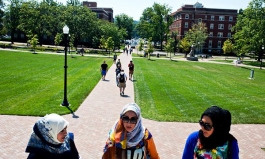Offering West Virginia students in Marshall University a chance to try the Islamic headscarf, a group of Muslim students held a hijab event to raise awareness about the Islamic headscarf and correct misconceptions surrounding it.
“We want to revive the Muslim Student Association group because we haven’t been involved as much as we would like, lately,” Suzann Al-Qawasmi, graduate from Marshall University, who helped in coordinating the event, told Marshall Parthenon on Tuesday, September 16.
“So, we set up a table and brought scarves for girls to try on, just to see what it’s like. One girl said she still felt pretty even with the scarf on. That was the kind of reaction we were hoping for.”
Organized by the Muslim Student Association (MSA), the event was held on Tuesday from 11am to 3pm at the Memorial Student Center.
At the event, several students tried hijab, sharing their experience after donning it for the first time.
“One girl wanted to try the hijab on, and then her whole group of friends she was with tried them on,” Al-Qawasmi said.
“They walked around campus afterward with the hijabs still on, so they could see the reactions from other people.”
For C.J. Payne, a business major, the event has educated her on interesting details about hijab.
“I learned that the only men that Muslim women want to see in their full beauty are the men who are closest to their hearts,” Payne said.
“It is for modesty.”
Not only students but also university staff has tried the hijab.
“It was an experience for me,” said Allyson Jasper, elementary education major specializing in pre-k, who tried on the hijab for the first time at the event.
“I put the hijab on, and I still felt like me. It made me realize that you can shine through and be yourself no matter what you’re wearing.”
Islam sees hijab as an obligatory code of dress, not a religious symbol displaying one’s affiliations.
US Muslims are estimated to be between six to seven millions and a recent Pew research found that American Muslims are the most moderate around the world.
The research showed that US Muslims generally express strong commitment to their faith and tend not to see an inherent conflict between being devout and living in a modern society.
/149

